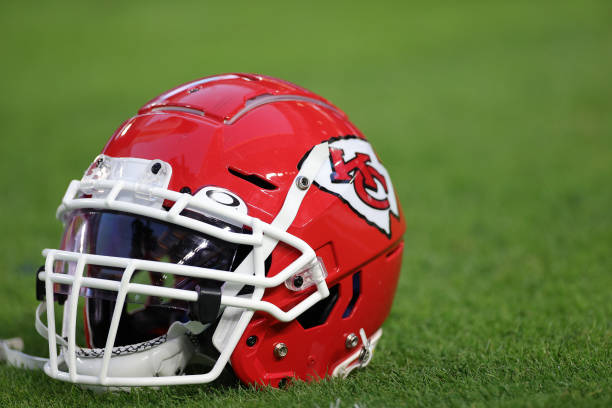Kansas City Chiefs quarterback Patrick Mahomes is not just a star athlete; he is arguably the most valuable player in the NFL. With a $450 million contract and multiple MVP titles, Mahomes stands as the cornerstone of the Chiefs’ success. Protecting such a valuable asset becomes paramount, and this responsibility extends beyond the gridiron. Recently, ESPN reporter Marc Raimondi highlighted a compelling issue: Mahomes could forfeit substantial financial guarantees if injured while indulging in one of his favorite pastimes, like basketball.
Mahomes’ impact on the Chiefs transcends the traditional role of a quarterback. His on-field prowess and leadership have led the team to Super Bowl victories and regular playoff appearances. His ability to read defenses, execute plays with precision, and adapt under pressure sets him apart. These qualities are not just significant for winning games but also for maintaining the franchise’s status as a perennial Super Bowl contender.
The Chiefs’ investment in Mahomes is more than monetary. It’s a long-term commitment to building a dynasty around him, reflecting their confidence in his ability to lead the team to sustained success. In this context, protecting Mahomes’ health and career longevity becomes a strategic imperative for the Chiefs.
Raimondi’s report underscores the strict measures the Chiefs take to ensure their prized quarterback remains in peak condition. According to his article, Mahomes could void guarantees in his contract if injured while participating in prohibited activities such as basketball . This clause is part of a broader NFL trend where players are restricted from engaging in activities that could jeopardize their health and, by extension, their careers.
Chiefs head coach Andy Reid elaborates on this policy, stating, “All the dangerous things. Things where they get hurt, you don’t want them to do” . This protective stance isn’t unique to Mahomes but extends to all players, reflecting a league-wide priority to mitigate risks associated with non-football activities.
The restriction on playing basketball, in particular, draws attention because Mahomes is known to be an avid fan of the sport. His passion for basketball is evident in his decision to install a state-of-the-art basketball court in his Kansas City mansion . This move, while personally fulfilling, presents a conundrum. During an interview three years ago, Mahomes mentioned his plan to build the court, humorously adding, “Just don’t tell [Chiefs general manager] Brett Veach” . The remark highlights the delicate balance athletes must maintain between their personal interests and professional obligations.
The Chiefs’ approach to safeguarding Mahomes’ health by limiting off-field activities is part of a larger trend in professional sports. Teams are increasingly aware of the financial and competitive ramifications of injuries sustained outside of sanctioned activities. These policies reflect a growing understanding of athletes as investments that require comprehensive risk management strategies.
For Mahomes, the stakes are exceptionally high. His contract, performance, and the team’s fortunes are intricately linked. Any injury could not only affect his earning potential but also derail the Chiefs’ ambitions for future titles. Thus, the stringent clauses in his contract serve as a safeguard, ensuring that his focus and physical well-being remain aligned with the team’s goals.
Patrick Mahomes represents more than just a quarterback for the Kansas City Chiefs; he embodies their aspirations for continued excellence. Protecting such a valuable player from unnecessary risks is a prudent and necessary measure. While it might limit Mahomes’ ability to engage in beloved hobbies like basketball, it ultimately serves the greater good of both his career and the Chiefs’ long-term success. In the high-stakes world of the NFL, such precautions are not just advisable—they are essential.

